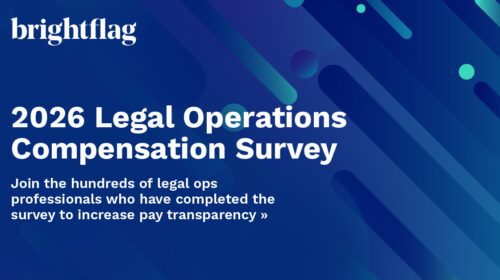The Legal Ops Dictionary: Key Terms to Know
Though the legal operations function has been around for just a few decades, there are certain legal ops terms that have evolved over time as regulations and technology have changed.
Whether you are new to legal operations or just need to brush up on some definitions, here are more than 50 of the most common legal ops terms every in-house team member should know.
Legal Operations and Technology
Legal Operations
Legal operations, or legal ops, refers to a set of practices in-house legal teams can employ to make the delivery of legal advice more efficient and impactful.
Often, legal operations is managed by a dedicated person, such as a legal operations manager, or by a dedicated function, known as the legal operations team. These individuals handle items outside of the practice of law, so that legal professionals can focus on delivering legal advice. This includes:
- Outside counsel management
- Legal technology
- Budgeting
- Business process improvement
- Project management
Legal Operations Software
Legal operations software is a label that applies to a broad range of products that help legal departments develop more efficient processes and pursue more data-driven strategies. Legal operations software includes legal intake, matter management, legal spend management, document management, e-signature, e-discovery, and analytics tools.
Legal Process Improvement
Legal process improvement is a framework designed to drive more efficient processes, higher quality outcomes, and reduced legal spend. Legal process improvement applies techniques from Six Sigma and other methodologies to ongoing operational processes in the legal department.
Legal Workflow Automation
Legal workflow automation takes manual, repetitive, and time-consuming legal tasks and creates systems to complete these tasks digitally with minimal human oversight. Common workflows that can be automated include invoice review and matter intake. Legal workflow automation minimizes errors and improves accuracy.
Legal Digital Transformation
Legal digital transformation encompasses the integration of digital technology into all facets of a legal department, marking a shift from manual processes to digital solutions. This includes automating workflows, improving data management, and enhancing decision-making processes to increase efficiency, reduce costs, and improve the accuracy and accessibility of information.
Legal AI
Legal AI refers to specially trained technology that harnesses the power of artificial intelligence and applies it to legal work. Unlike general AI models, legal AI is built with an in-depth understanding of legal terminology and workflows, which in turn allows it to more accurately assist with legal tasks like legal invoice review, contract review, and e-discovery.
Legal Operations Optimization
Legal operations optimization is the process of improving the efficiency and effectiveness of a legal department through data analysis, streamlined workflows, and better vendor management. Using legal spend management and matter management software, legal operations professionals look to optimize processes to reduce costs and maximize resources.
In-House Legal and Corporate Counsel
General Counsel
The General Counsel, known in some organizations as the Chief Legal Officer (CLO), is the head of the legal department of an organization. The General Counsel is the highest-ranking in-house attorney and serves as the principal legal advisor to the organization’s executives and board of directors.
Deputy General Counsel
The Deputy General Counsel assists the General Counsel with managing the legal department. This role often leads a team of legal professionals, directs the provision of legal advice on matters, and oversees outside counsel relationships.
Internal Counsel
Internal, or in-house, counsel are attorneys employed directly by an organization to provide legal advice and guidance to the company’s executives, managers, and employees. In-house counsel are deeply entrenched in the mechanics of the business they serve and possess an intimate understanding of the company’s operations, goals, and legal requirements.
Outside Counsel Management
Outside Counsel
Outside counsel are the legal service providers engaged by an in-house legal team to deliver legal services, such as law firms and alternative legal service providers (ALSPs). Organizations often hire these providers to take advantage of their increased work capacity and/or specialized knowledge and experience.
Legal Service Provider
Legal service providers are organizations outside the legal department that offer legal services or related legal support. They include law firms, Alternative Legal Service Providers (ALSPs), and other providers.
Alternative legal service provider (ALSP)
Alternative legal service providers (ALSPs) are legal service providers that operate outside the traditional law firm structure. They offer a wide range of legal support services, often focusing on high-volume routine tasks such as e-discovery, contract management, and legal research.
Law Firm Benchmarking
Law firm benchmarking is the business practice of evaluating similar vendors against the same criteria for the purposes of drawing valid comparisons and developing performance standards. Using these benchmarks, the in-house legal team can objectively and effectively identify high-performing vendors.
Legal Process Outsourcing (LPO)
Legal process outsourcing (LPO) is the practice of delegating legal tasks to an external service provider. It can be used by in-house teams or law firms to delegate certain tasks to specialized providers. The goal of LPO is typically to reduce costs and increase efficiency.
Legal Vendor Management
Legal vendor management is the process of overseeing the relationships, activities, and performance of the legal department’s third-party vendors. This work involves managing outside counsel, but can also encompass managing relationships with other types of vendors, such as legal technology providers and consultants.
Legal Vendor Management Software
Legal vendor management software is a tool that helps legal departments make data-based decisions about their vendors and drive better relationships with outside counsel. The platform allows in-house teams to assess vendors using quantitative data like cost effectivness and qualitative data like performance to efficiently allocate resources.
Outside Counsel Management
Outside counsel management involves developing optimal relationships with the legal team’s outside counsel partners. It includes identifying the best legal service provider to engage for different types of legal work, reviewing outside counsel performance and providing feedback, and ensuring the cost-effectiveness of outside counsel engagements.
Outside Counsel Guidelines
Outside counsel guidelines set out the expectations corporate legal teams have for their legal service providers. In-house teams use these guidelines to outline how outside counsel should manage legal matters, billing practices, budgets, diversity, equity, and inclusion (DEI), and the use of technology. They set the foundation for a successful relationship with outside counsel, allowing both parties to focus on providing value to the business.
Metrics, KPIs, and Analytics
Legal Department Metrics
Legal department metrics are the data points used to evaluate the effectiveness, efficiency, and impact of a legal department within an organization. They ensure that the legal department’s day-to-day activities further the company’s broader objectives and often relate to the efficient delivery of legal services, cost control, and resource management.
Legal Operations Dashboard
A legal operations dashboard is a collection of charts and graphs that make it easy to monitor the metrics important to the legal department.
Legal Spend Reporting
Legal spend reporting provides data and visualizations that provide visibility into the expenses of a legal department. The goal of legal spend reporting is to analyze and improve cost control, vendor relationships, and the overall perception of the legal function within the business.
Legal Data Analytics
Legal data analytics uses data to identify patterns and trends in legal work and spend information so the in-house team can make more strategic decisions. Legal data analytics tools help balance the department workload, reduce matter cycle times, and identify ways to be more efficient.
Matter Management
Legal Matter
A legal matter is a legal issue, project, or case that requires legal representation or advice from an organization’s legal department. A matter can be as routine as assisting an employee with a visa application or as large and complex as a merger or acquisition.
Matter Management
Legal matter management refers to the processes, practices, and tools legal professionals use to oversee and handle legal matters, meaning cases or projects. It encompasses a wide range of activities and responsibilities, including tracking key matter information, document management, and task management.
Matter Management Software
Matter management software is a centralized platform to organize, manage, and track legal matters from intake to closing. These systems provide a clear record of activities and a central repository for tasks, communication, and documents relating to a specific matter.
Matter Tracking
Matter tracking is monitoring a legal matter throughout its lifecycle, including deadlines, status updates, and key contacts. Matter tracking is typically done within dedicated matter management software.
E-Billing and Spend Management
There are a variety of legal ops terms related to the responsibility of in-house teams to effectively manage their legal spend, and many of the ones listed below have some degree of overlap in their definitions. However, while these terms do share some things in common, they each have a distinct focus that sets them apart.
Legal Spend Management
Legal spend management is the practices, strategies, and tools legal departments use to control and efficiently manage their legal expenses. This typically includes overseeing costs related to outside counsel, alternative legal service providers (ALSPs), and other associated legal costs.
Legal Spend Management Software
Legal spend management software addresses the specific challenges of legal spend, including budgeting, invoice review, reporting, and enforcing outside counsel guidelines. The software provides insights that inform the department’s strategic decisions.
Legal Billing
Legal billing is a process in which law firms log their time worked and bill clients for legal services provided. It involves generating invoices and using various pricing models, such as hourly rates, flat fees, and contingency fees.
Legal E-Billing
Legal e-billing is the electronic submission, review, approval, and payment of legal invoices. It streamlines the traditional paper-based billing process by leveraging technology to more efficiently manage and track legal expenses. In addition, legal e-billing can refer to other processes used to manage legal spend, such as budgeting and accruals reporting.
Legal E-Billing Software
Legal e-billing software is technology that simplifies the billing process by centralizing information on legal spend and making it easy for vendors to submit invoices. Automated processes within the software reduce manual tasks, like invoice review.
Legal Expense Tracking
Legal expense tracking involves recording, monitoring, and analyzing all the costs associated with legal matters. For in-house departments, tracking legal expenses is the first step to identifying efficiencies and opportunities to reduce legal spend. Alternatively, ‘legal expense tracking’ is sometimes used to refer only to tracking the non-hourly expenses billed on a matter, such as travel time and courier fees.
Enterprise Legal Management
Enterprise Legal Management includes the strategies, processes, and technologies implemented by organizations to manage their legal operations and optimize the delivery of legal services. Enterprise Legal Management generally encompasses legal matter management and legal spend management.
Enterprise Legal Management Software
Enterprise legal management software provides a comprehensive solution for in-house legal teams looking to boost their team’s productivity and efficiency. It transforms how teams manage matters and spend. It typically includes matter management, e-billing, and spend management functionality.
Legal Budget Management
Legal budget management is the process of tracking, managing, and analyzing legal spend to make sure it is in line with the budget. Budgets can be tracked at the matter, department, or organization level.
Legal Cost Control
Legal cost control involves keeping costs in check or reducing the relative cost of legal service delivery. By managing matter budgets and applying outside counsel guidelines diligently, in-house legal teams can manage legal spend and identify opportunities for efficiency.
Legal Spend Analytics
Legal spend analytics uses a department’s spend data to identify patterns and trends in legal spend. Legal spend analytics tools help improve resource management and identify ways to reduce legal spend.
Legal Invoicing Terms
Block Billing
Block billing is the practice of including a block of time on a legal invoice with a narrative description of how that time was spent, including an itemized list of the tasks completed. The billing entries often include tasks that span multiple codes but don’t explain how long was spent on each task, making it hard for the in-house team to understand spend. Block billing can lead to inaccurate reporting on the cost of completing legal tasks and resourcing.
Double Billing
Double billing is when law firms bill multiple clients for the same work, bill the same work to the same client on multiple matters, create duplicate entries on a single invoice, or incorrectly resubmit an invoice due to an administrative error.
Legal Bill Review
Legal bill review, also known as legal invoice review, is the process of verifying that invoices comply with your outside counsel guidelines. Traditionally a manual and time-consuming process, AI-enabled tools now streamline invoice review by automatically flagging potential issues.
Billing Standards and Formats
LEDES File Format
LEDES is a widely used standard format for electronic data exchange in the legal industry. LEDES was developed to provide a consistent and uniform way to exchange legal billing and other legal-related data between law firms, corporate legal departments, and other legal service providers.
LEDES 1998B
LEDES 1998B is the oldest and simplest of LEDES billing formats and remains the most broadly used standard. It includes 24 data fields but lacks support for tax information and alternative fee arrangements (AFAs). It was last updated in 2014, according to the LEDES Oversight Committee.
LEDES 1998BI
LEDES 1998BI is an updated version of the LEDES 1998B standard file format with support for a single tax type on each invoice line item, creating a version of the “1998B” LEDES format that was fit for use outside the United States where legal services incur taxes. As of its 2020 update, this format now contains 52 data fields.
LEDES XML 2.0
The LEDES XML 2.0 format uses extensible markup language (.xml) to significantly expand the number of data fields to 172. Its most notable updates include support for multiple taxes per line item and AFA compatibility.
LEDES XML 2.1
The LEDES XML 2.1 version contains 206 data fields, with increasingly nuanced support for tax, timekeeper, and regulatory issues. The latest update, made in March 2023, enables handling of timekeeper rates based on the current exchange rate.
LEDES XML 2.2
The LEDES XML 2.2 version is the only LEDES file format that supports tiered tax requirements. The LEDES Oversight Committee also updated this format in March 2023 to enable handling of timekeeper rates based on the current exchange rate.
LEDES XML 2000
LEDES XML 2000 is a retired format no longer supported by the LEDES Oversight Committee. It was replaced by LEDES XML 2.0 in 2006.
LEDES Billing
LEDES billing is a standardized and globally recognized electronic billing process using the LEDES file format. This legal billing standard enabled in-house departments to better understand and analyze their legal spend. However, the LEDES system includes some issues, such as the fact that coding of line items relies on manual input by law firm timekeepers.
UTBMS (Uniform Task-Based Management System)
The UTBMS is a standardized coding system used in the legal industry to classify and track the time, tasks, and expenses associated with legal services. UTBMS was developed by the American Bar Association (ABA), the Association of Corporate Counsel, and a group of major corporate law departments and law firms in response to a growing need for a more structured and uniform approach to tracking legal services.
ABA Litigation Codes
ABA codes are the subset of UTBMS codes that were created by the ABA Working Group on Task-Based Billing Codes. The most widely used ABA UTBMS codes are the litigation code set, created in 1997. The terms “ABA codes” and “UTBMS codes” are often used interchangeably, especially in the case of the litigation code set.
Legal Billing Codes
Legal billing codes are a system of codes used to categorize and track legal work and expenses. Typically, legal billing codes are pulled from UTBMS codes, but in some instances, such as when no appropriate code set covers the work being performed, companies may decide to create and track custom legal billing codes.
Alternative Fee Arrangements
Alternative Fee Arrangements
Alternative fee arrangements are non-traditional pricing structures used to determine the cost of legal services rather than using the traditional hourly billing model. Alternative fee arrangements are generally designed to provide flexibility, maintain cost certainty, and align the interests of clients and law firms by offering alternatives to billing based solely on the number of hours worked.
Accruals
Legal Accruals
Legal accruals are the estimated costs of legal work performed by law firms, provided by the in-house team to the finance department as part of the accrual method of accounting. Because law firms send invoices after the month in which the work was performed, in-house legal teams need to collect legal accruals for work-in-progress from their firms so the finance team can account for these costs.
Want to Keep Learning?
Sign up for Brightflag’s newsletter below, and get the best legal operations resources—including blogs, webinars, videos, and more—delivered straight to your inbox.



